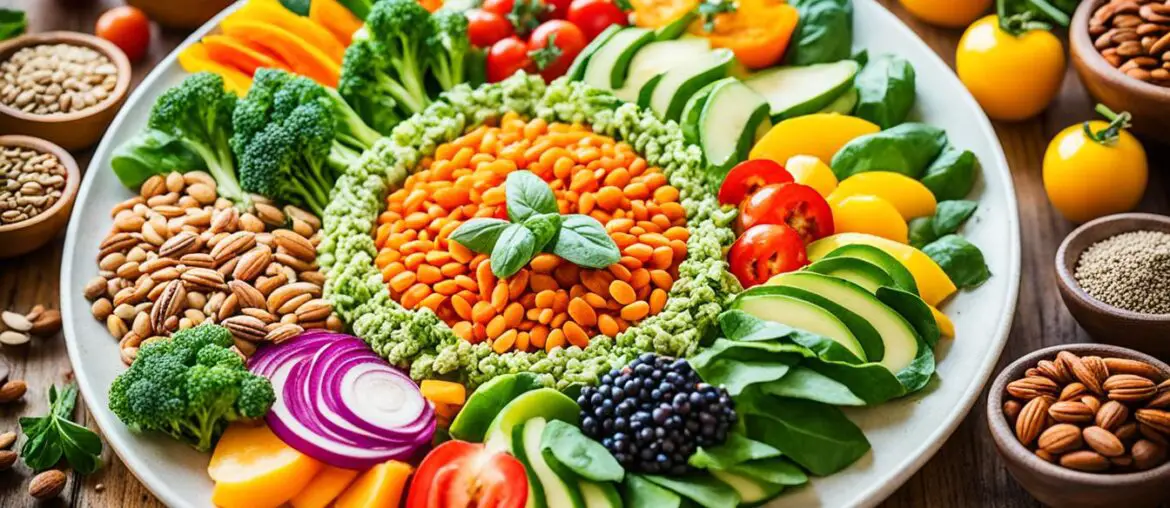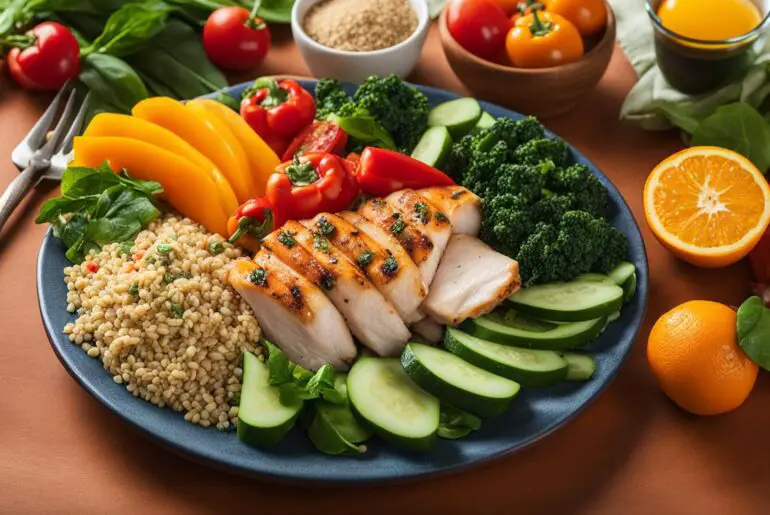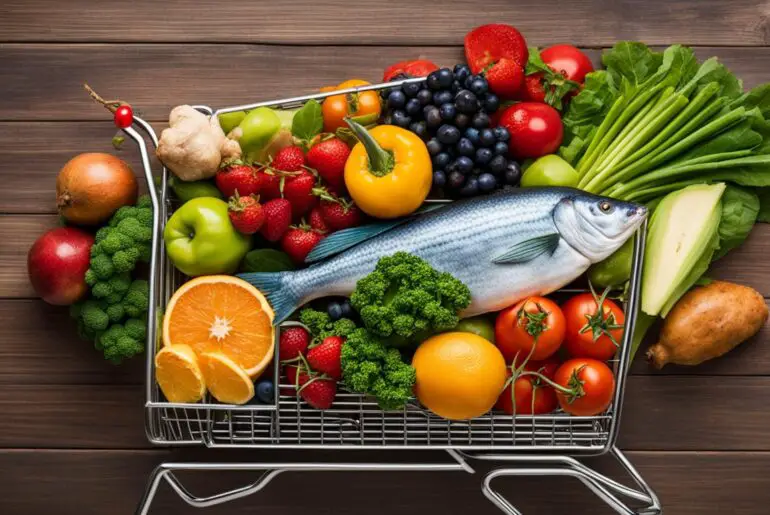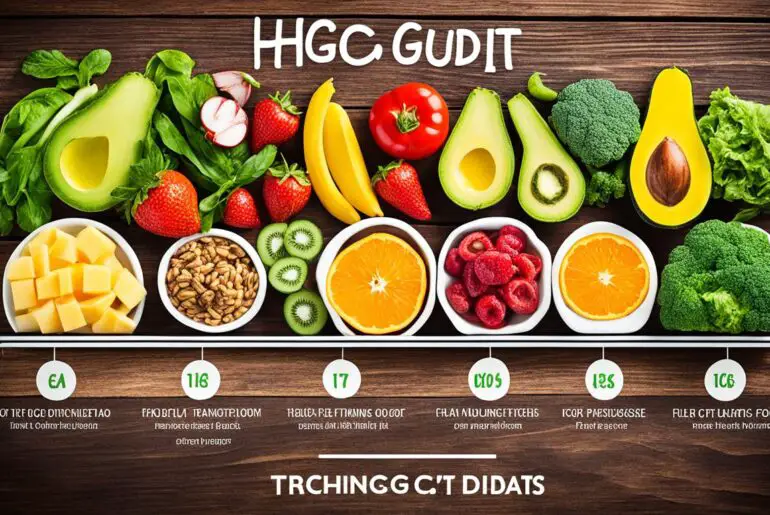Did you know that the HCG diet, known for its ability to promote rapid weight loss, can be tailored to accommodate a vegetarian lifestyle? That’s right, even if you’re a vegetarian, you can still enjoy the benefits of the HCG diet without compromising your dietary choices.
In this comprehensive guide, I’ll provide you with a healthy food list and meal plan specifically designed for vegetarians who want to follow the HCG diet. From protein options and vegetable selections to carbohydrates and beverages, you’ll discover a wealth of vegetarian-friendly choices that will support your weight loss journey while honoring your plant-based lifestyle.
Key Takeaways:
- The vegetarian HCG diet offers a plant-based alternative to the traditional HCG diet.
- Vegetarians can enjoy a variety of protein options such as tofu, tempeh, and legumes.
- Vegetables and fruits play a vital role in the vegetarian HCG diet, providing essential nutrients.
- While carbs are limited, vegetarians can still include small portions of options like breadsticks and melba toast.
- Choosing suitable dairy or vegan options ensures vegetarians meet their protein needs on the HCG diet.
Understanding the Vegetarian HCG Diet
The vegetarian HCG diet offers a modified approach to the traditional HCG diet, specifically tailored to accommodate the dietary restrictions of vegetarians. While the original HCG diet incorporates animal protein sources, the vegetarian version replaces them with vegetarian-friendly options. By understanding the guidelines and requirements of the vegetarian HCG diet, you can achieve successful weight loss results while adhering to your plant-based lifestyle.
The Benefits of the Vegetarian HCG Diet
Following a vegetarian diet has been associated with numerous health benefits, including lower risks of heart disease, obesity, and certain types of cancer. The vegetarian HCG diet provides an opportunity for vegetarians to experience the benefits of the HCG diet while still aligning with their dietary preferences.
Eliminating Meat Protein Sources
The vegetarian HCG diet eliminates meat-based proteins such as chicken, beef, and fish. Instead, it focuses on incorporating alternative protein options that are vegetarian-friendly. These protein sources can include tofu, tempeh, legumes, cottage cheese, and protein powders.
Creating a Vegetarian Meal Plan
Developing a well-rounded vegetarian meal plan for the HCG diet is essential to ensure you are getting all the necessary nutrients while following the program. This includes incorporating a variety of vegetables, fruits, and carbohydrates, while keeping the calorie intake within the recommended range.
Supplementation for Vegetarians
While the vegetarian HCG diet aims to provide all the necessary nutrients through whole foods, some vegetarians may choose to supplement their diet. This can be done by incorporating vegetarian-friendly supplements that support a healthy and balanced diet.
Quotes
Vegetarians can achieve successful weight loss results while maintaining their plant-based lifestyle.
Now that you have a better understanding of the vegetarian HCG diet, let’s explore the protein options available for vegetarians on the HCG diet in the next section.
Protein Options for Vegetarians on the HCG Diet
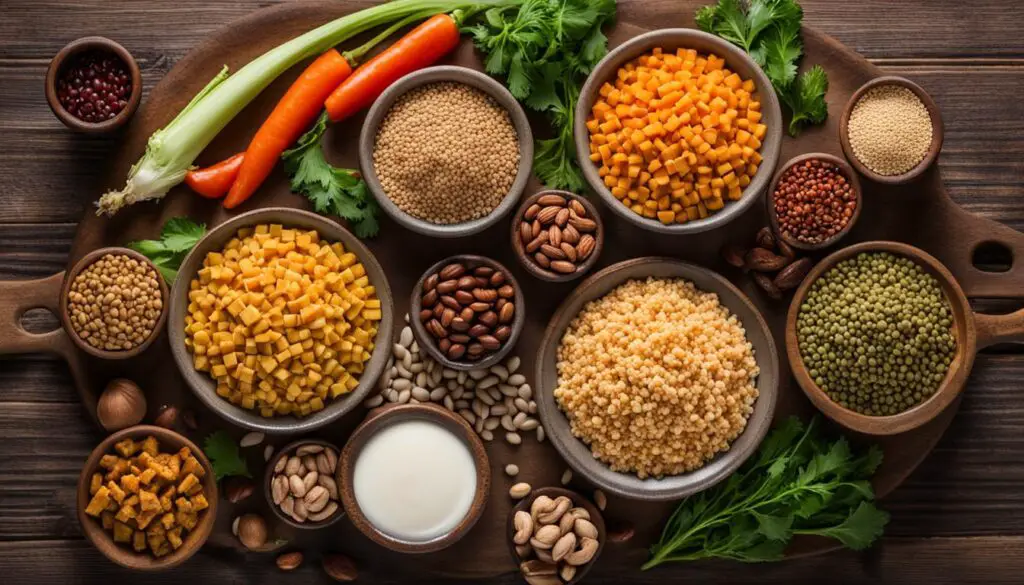
As a vegetarian following the HCG diet, it’s important to find suitable protein sources to support your weight loss journey. While animal proteins are commonly recommended on the traditional HCG diet, there are plenty of plant-based alternatives to choose from to meet your protein needs. Incorporating a variety of protein-rich foods will not only help you stay satiated but also support muscle preservation and overall health.
Some vegetarian protein sources that are suitable for the HCG diet include:
- Tofu: A versatile soy-based protein that can be used in various dishes, from stir-fries to smoothies. It is low in calories and high in protein, making it an excellent choice for vegetarians on the HCG diet.
- Tempeh: Another soy-based protein option that is rich in vitamins, minerals, and probiotics. It has a nutty flavor and can be marinated and grilled or added to salads for a nutritious boost.
- Legumes: A diverse group of plant-based proteins, including lentils, chickpeas, black beans, and kidney beans. They are not only high in protein but also provide essential fiber, making them a filling and nutritious choice for the HCG diet.
- Cottage Cheese: A low-fat dairy option that is rich in protein and can be easily incorporated into meals or enjoyed as a snack. Opt for low-fat or fat-free cottage cheese to stay within the calorie limits of the HCG diet.
- Protein Powders: Vegetarian-friendly protein powders, such as pea protein or hemp protein, can be a convenient option to increase your protein intake. They can be easily added to smoothies or used in baking recipes to create protein-rich treats.
When choosing protein sources on the HCG diet, it’s essential to ensure they are vegetarian-friendly and fit within the calorie restrictions of the diet. Consulting with a healthcare provider or weight loss specialist can help you determine the ideal protein intake for your individual needs and customize your meal plan accordingly.
Vegetable and Fruit Selection for Vegetarians on the HCG Diet
Vegetables and fruits play a vital role in the vegetarian HCG diet, providing essential nutrients to support overall health and wellbeing. As a vegetarian, you have a wide range of delicious options to choose from to create a satisfying and nutritious meal plan.
Incorporating Vegetables into Your Meals
When it comes to vegetables, the possibilities are endless. You can enjoy nutrient-rich leafy greens like kale and spinach, which are packed with vitamins and minerals. Lettuce, cucumbers, and tomatoes are also excellent choices that add flavor and crunch to your meals. Other options include broccoli, bell peppers, zucchini, and cauliflower.
Remember, it’s important not to mix vegetables together. Eating them separately ensures that you get the maximum nutritional benefits from each vegetable.
Fruit Moderation on the HCG Diet
While fruits are delicious and nutritious, they should be consumed in moderation on the HCG diet due to their natural sugar content. Apples, oranges, grapefruits, and strawberries are some of the fruit options that you can enjoy in limited quantities.
Here’s an example of a vegetarian-friendly meal plan that incorporates vegetables and fruits:
- Breakfast: Spinach and tomato omelet
- Lunch: Lettuce wrap filled with cucumbers and bell peppers
- Snack: Apple slices with a sprinkle of cinnamon
- Dinner: Grilled zucchini and cauliflower steak
- Snack: Orange segments
Incorporating a variety of vegetables and fruits into your meals ensures that you receive a wide range of vitamins, minerals, and antioxidants essential for maintaining your health and achieving your weight loss goals on the vegetarian HCG diet.
Carb Options for Vegetarians on the HCG Diet
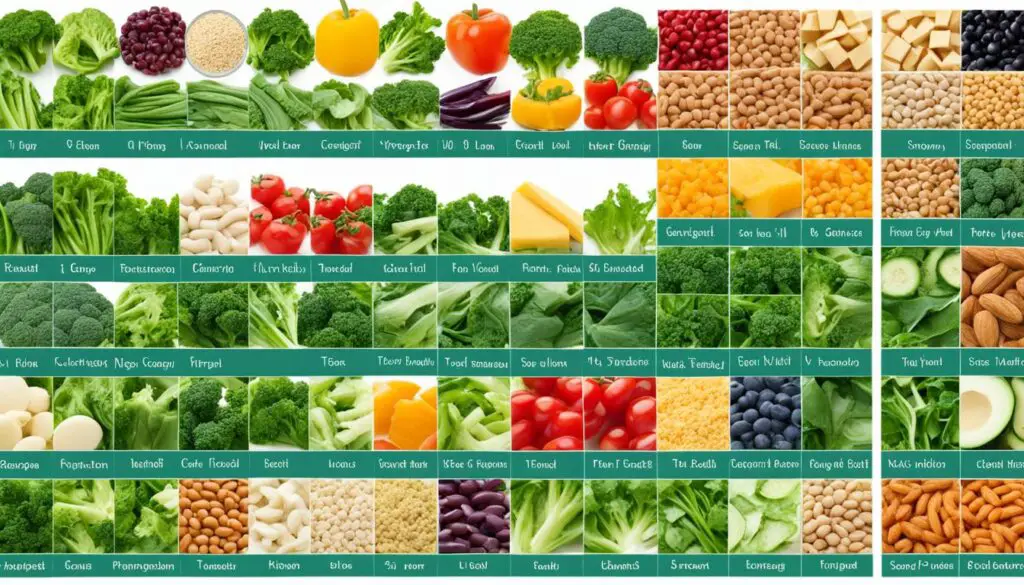
While following the HCG diet, carbohydrates are limited to promote weight loss. However, vegetarians can still incorporate small portions of carb options into their meals. By choosing alternative carb sources, you can maintain a plant-based HCG diet without compromising your weight loss goals.
Instead of regular bread or crackers, consider the following low-carb alternatives:
- Breadsticks
- Melba toast
- Wasa toast
These options provide a satisfying crunch and can be enjoyed in moderation during meal times. Remember, the key is to prioritize low-carb options to stay within the dietary restrictions of the HCG diet while still providing some carbohydrate fuel for your body.
“Choosing low-carb carb options is essential while following the HCG diet as a vegetarian. These alternatives provide the necessary satisfaction without derailing your weight loss journey.” – HCG Diet Specialists
Beverages and Seasonings for Vegetarians on the HCG Diet
As a vegetarian on the HCG diet, you have a variety of beverage options to choose from. These include:
- Tea: Enjoy a cup of your favorite herbal tea to stay hydrated and add flavor to your diet. Popular choices include green tea, chamomile, and peppermint tea.
- Coffee: You can still have your morning coffee, but remember to consume it in moderation. Opt for black coffee or use a small amount of a vegetarian-friendly non-dairy creamer.
- Soy milk or almond milk: These plant-based milk alternatives are suitable for use in smoothies and can be added to your coffee or tea.
It’s essential to avoid regular milk and sugary beverages like soda or fruit juices, as they can interfere with your weight loss goals and the overall effectiveness of the HCG diet.
When it comes to seasonings and additives, there are plenty of vegetarian-friendly options to enhance the flavor of your meals. Some examples include:
- Lemon juice: Freshly squeezed lemon juice can add a tangy taste to your dishes without adding extra calories.
- Garlic: Using garlic can infuse your meals with flavor and provide health benefits. It’s a versatile seasoning that adds depth to savory dishes.
- Thyme: This aromatic herb can elevate the taste of various dishes like soups, stews, and roasted vegetables.
- Sea salt: Use sea salt sparingly to enhance the taste of your meals. It’s important to note that excessive salt intake can lead to water retention, so moderation is key.
- Basil: Basil is a fragrant herb that pairs well with tomato-based dishes, salads, and pasta sauces.
- Pepper: Add a dash of black or white pepper to season your meals and give them a slight kick.
- Apple cider vinegar: Use apple cider vinegar as a dressing for salads or as a marinade for tofu and vegetables.
Remember to read the labels of seasonings and additives to ensure they are low in carbs and do not contain any animal products, such as animal-derived flavor enhancers.
Dairy and Vegan Options for Vegetarians on the HCG Diet
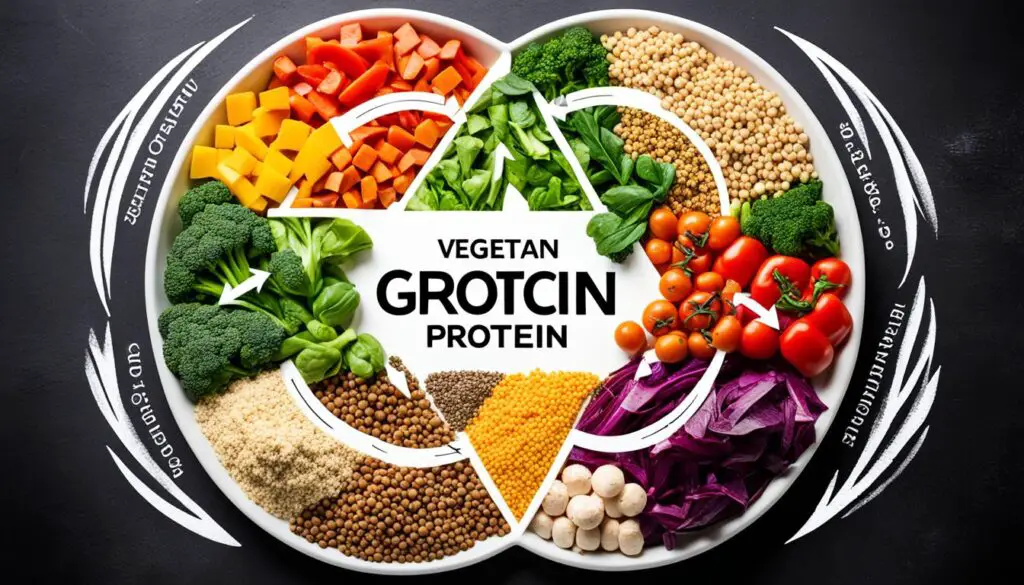
As a vegetarian on the HCG diet, you have a variety of dairy and vegan options to choose from, ensuring you meet your protein needs while following the diet. Whether you consume dairy products or follow a vegan lifestyle, there are alternatives available to suit your dietary preferences.
Dairy Options:
For vegetarians who include dairy in their diet, here are some suitable options:
| Food | Description |
|---|---|
| Vegan Cottage Cheese | A plant-based alternative to traditional cottage cheese, providing a good source of protein. |
| Eggs | High-protein food that can be incorporated into various meals and snacks while following the HCG diet. |
| Vegetarian Cheese | Choose low-fat or fat-free options to stay within the calorie limits of the HCG diet. |
Vegan Options:
If you follow a vegan lifestyle and avoid animal products altogether, consider the following options:
| Food | Description |
|---|---|
| Vegan Protein Powder | A convenient and easily digestible source of plant-based protein, available in various flavors and formulations. |
| Tofu | A versatile protein-rich food that can be used in a variety of dishes, such as stir-fries and salads. |
| Tempeh | A fermented soybean product with a nutty flavor, providing a significant amount of protein. |
| Plant-Based Dairy Substitutes | Explore options like almond milk, soy milk, coconut milk, or oat milk as an alternative to dairy milk. |
Remember to choose options that align with the guidelines of the HCG diet and provide adequate protein while keeping the calorie intake in check for optimal weight loss results.
Including HCG Diet Approved Foods in Vegetarian Meals
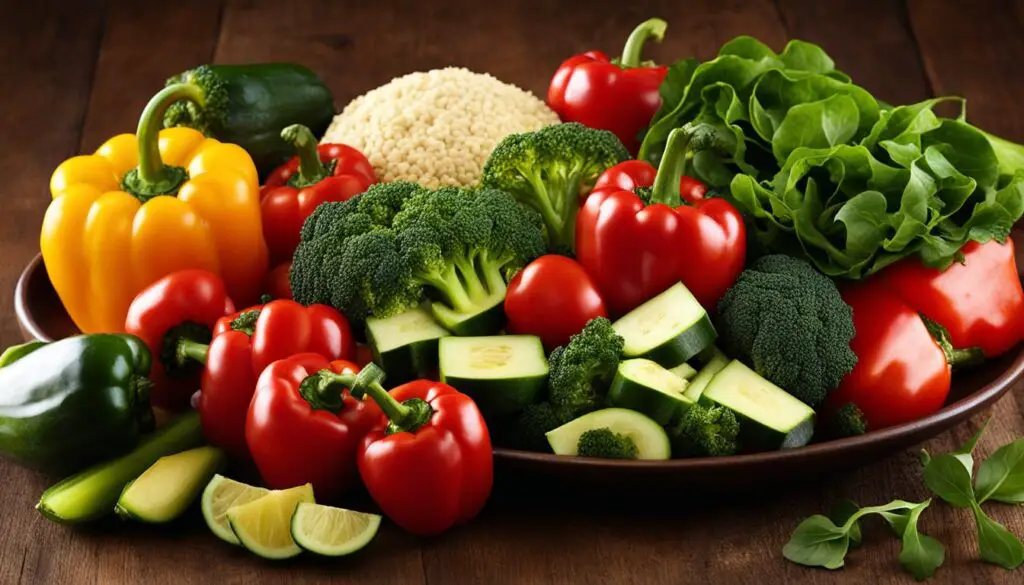
Creating balanced and nutritious meals on the vegetarian HCG diet is essential for achieving optimal results. By incorporating approved foods into each meal, you can stay within the calorie limits of the diet while enjoying a variety of delicious options.
To build a well-rounded vegetarian meal on the HCG diet, it’s important to include a serving of protein, a serving of vegetables, a serving of fruit, and a serving of carbs (if desired). Let’s explore how you can incorporate these elements into your vegetarian HCG diet meal plan.
Protein Options for Vegetarian Meals
As a vegetarian, you have plenty of protein options to choose from. Consider incorporating plant-based protein sources such as tofu, tempeh, legumes, cottage cheese, and vegetarian protein powders into your meals. These alternatives provide the necessary protein intake without compromising your vegetarian lifestyle.
Vegetables and Fruits for Nutrient-Rich Meals
Vegetables and fruits should be key components of your vegetarian HCG diet meals. Opt for a variety of vegetables like kale, spinach, lettuce, cucumbers, tomatoes, and broccoli. These can be enjoyed either raw or cooked, providing you with essential nutrients and fibrous content.
When it comes to fruits, choose options like apples, oranges, grapefruits, and strawberries. These fruits offer natural sweetness and are packed with vitamins and antioxidants. Incorporating vegetables and fruits into your meals ensures a well-balanced diet and provides the necessary nutrients for your body.
Carb Options for Added Energy
While carbohydrates are limited on the HCG diet, you can still include small portions of carb options in your vegetarian meals. Breads such as breadsticks, melba toast, and wasa toast can be excellent choices to provide some energy without compromising the diet’s guidelines. Remember to choose low-carb alternatives to maintain the calorie limits of the diet.
Meal Example:
| Meal | Ingredients |
|---|---|
| Breakfast |
|
| Lunch |
|
| Dinner |
|
Staying Hydrated and Flavorful
In addition to your meals, it’s important to stay hydrated. Opt for beverages such as tea, coffee (in moderation), herbal teas, and soy milk or almond milk for use in smoothies. Avoid sugary and high-calorie drinks to maintain the calorie restrictions of the HCG diet.
To enhance the flavor of your vegetarian HCG diet meals, you can use seasonings like lemon juice, garlic, thyme, sea salt, basil, pepper, and apple cider vinegar. These seasonings are low in carbs and add a delightful taste to your dishes without compromising the guidelines of the diet.
By including HCG diet approved foods in your vegetarian meals, you can create satisfying and nutritious dishes while staying on track with your weight loss goals. Remember to consult with healthcare providers or weight loss specialists to ensure the meal plan aligns with your individual requirements. With dedication and adherence to the guidelines, the vegetarian HCG diet can be an effective tool for weight loss and improved health.
The Phases of the Vegetarian HCG Diet
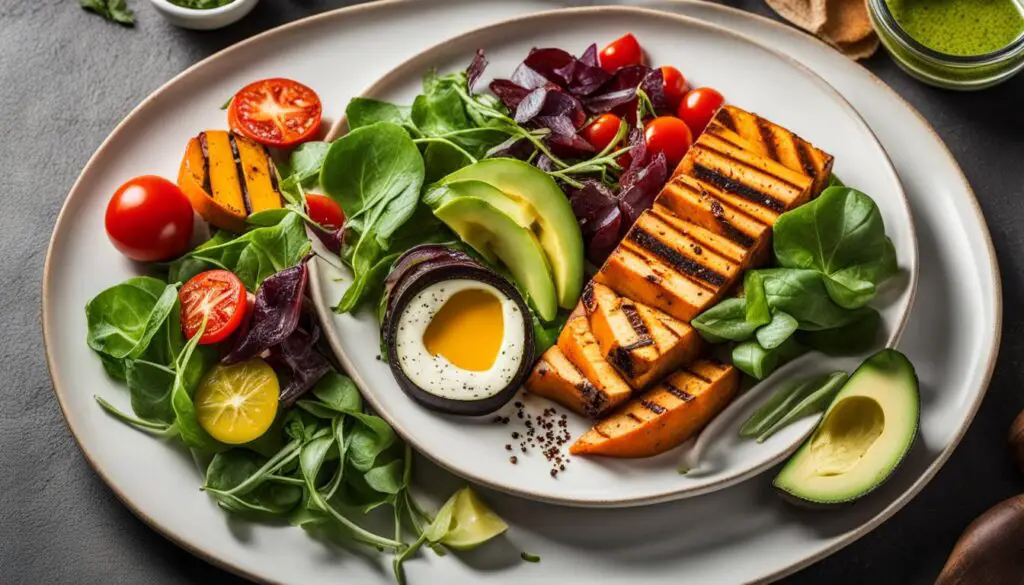
In order to achieve optimal results on the HCG diet, vegetarians need to follow three main phases: the loading phase, the weight loss phase, and the maintenance phase.
The Loading Phase:
This phase involves consuming high-calorie, healthy fat foods to build up fat stores in the body. It typically lasts for two days and prepares the body for the next phase of the diet.
The Weight Loss Phase:
During this phase, vegetarians restrict their daily caloric intake to 500-1200 calories while continuing with HCG injections. This enables the body to utilize stored fat for energy, resulting in significant weight loss. The weight loss phase typically lasts for three to six weeks, depending on an individual’s weight loss goals.
The Maintenance Phase:
Once the desired weight loss has been achieved, vegetarians enter the maintenance phase. This phase focuses on maintaining the weight loss and gradually reintroducing certain foods back into the diet. It is crucial to follow a balanced meal plan during this phase to ensure weight stability and long-term success.
By following these phases, vegetarians can navigate the HCG diet effectively and achieve their weight loss goals while enjoying a plant-based lifestyle.
| Phase | Description |
|---|---|
| Loading Phase | Consuming high-calorie, healthy fat foods to build up fat stores |
| Weight Loss Phase | Restricting daily caloric intake to 500-1200 calories while continuing with HCG injections |
| Maintenance Phase | Gradually reintroducing certain foods and focusing on weight stability |
Following the phases of the HCG diet protocol for vegetarians is essential for achieving optimal results and maintaining weight loss in the long run.
Conclusion
The vegetarian HCG diet provides a viable weight loss solution for vegetarians looking to combine a low-calorie diet with hormone injections. By substituting animal protein sources with vegetarian-friendly options and following a well-balanced meal plan, vegetarians can achieve successful weight loss results while maintaining their plant-based lifestyle.
However, it is crucial for vegetarians to consult with healthcare providers or weight loss specialists to ensure they meet their nutritional needs and customize the diet plan to their individual requirements. Professional guidance will help ensure a safe and effective weight loss journey.
With dedication and adherence to the guidelines, the vegetarian HCG diet can be an effective tool for weight loss and improved health. Remember to stay committed, track your progress, and don’t hesitate to seek support when needed. Embrace this opportunity to achieve your weight loss goals while staying true to your vegetarian values.
FAQ
What is the vegetarian HCG diet?
The vegetarian HCG diet is a modified version of the traditional HCG diet that accommodates the dietary restrictions of vegetarians. It eliminates meat protein sources and replaces them with vegetarian-friendly options.
What are the protein options for vegetarians on the HCG diet?
Vegetarians can choose from a variety of plant-based protein sources such as tofu, tempeh, legumes, cottage cheese, and protein powders. It is important to ensure adequate protein intake to support muscle preservation.
What vegetables and fruits can vegetarians eat on the HCG diet?
Vegetarians can enjoy a wide variety of vegetables like kale, spinach, lettuce, cucumbers, tomatoes, broccoli, and more. Fruits like apples, oranges, grapefruits, and strawberries can be enjoyed in moderation.
Can vegetarians include carbs in their meals on the HCG diet?
Yes, vegetarians can include small portions of carb options like breadsticks, melba toast, or wasa toast. It is important to prioritize low-carb options to stay within the dietary restrictions of the HCG diet.
What beverages and seasonings can vegetarians have on the HCG diet?
Vegetarians can enjoy beverages like tea, coffee (in moderation), herbal teas, and soy milk or almond milk for use in smoothies. Seasonings like lemon juice, garlic, thyme, sea salt, basil, pepper, and apple cider vinegar can be used, as long as they are low in carbs and do not contain animal products.
What are the dairy and vegan options for vegetarians on the HCG diet?
Vegetarians who consume dairy can include options like vegan cottage cheese, eggs, and vegetarian cheese. Vegans can choose from alternatives like vegan protein powder, tofu, tempeh, and plant-based dairy substitutes.
How can vegetarians create balanced meals on the HCG diet?
Vegetarians can create balanced meals by incorporating a serving of protein, a serving of vegetables, a serving of fruit, and a serving of carbs (if desired) into each meal. Variety is key to ensure a well-rounded diet.
What are the phases of the vegetarian HCG diet?
The vegetarian HCG diet consists of three main phases: the loading phase, the weight loss phase, and the maintenance phase. The loading phase involves consuming high-calorie, healthy fat foods to build up fat stores. The weight loss phase restricts caloric intake while continuing with HCG injections. The maintenance phase focuses on maintaining weight loss and gradually reintroducing certain foods.

